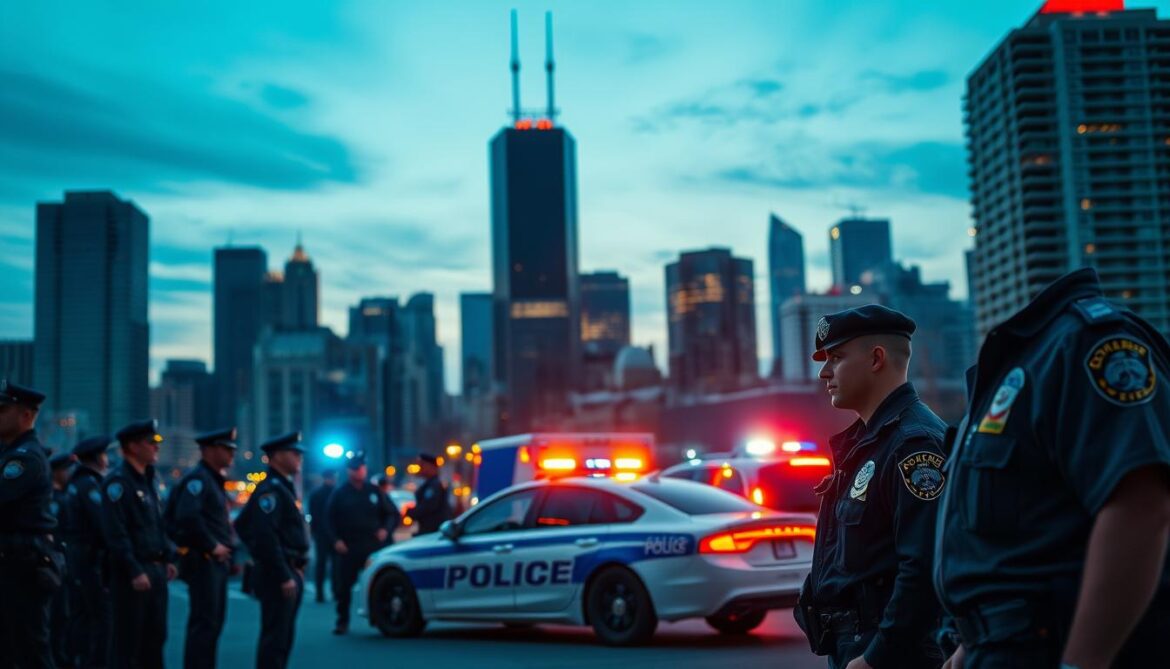Did you know Canadian officers intercepted over $29,000 worth of illegal substances in a single operation this year? This achievement highlights the critical work happening daily to protect neighborhoods across the province. Policing careers offer more than stability—they provide a chance to directly shape safer communities.
Modern public safety roles blend proactive crime prevention with community partnerships. From drug enforcement operations to traffic safety initiatives, professionals tackle diverse challenges. Recent collaborations between multiple agencies—like preparations for the 2025 Special Olympics—show how teamwork strengthens regional security.
Choosing this path means joining forces with dedicated teams addressing everything from organized crime to local safety concerns. Every shift brings opportunities to prevent harm and build trust with residents. You’ll find roles ranging from frontline patrols to specialized units, each contributing to reducing criminal activity.
What does this mean for your future? A career where your actions protect families, support vulnerable populations, and foster civic pride. Explore how these essential roles maintain order while offering personal growth and professional fulfillment.
Understanding Law Enforcement Careers in Ontario
Modern public safety professionals wear many hats while building stronger neighborhoods. From coordinating major events to dismantling criminal networks, these roles demand adaptability and teamwork. Your journey here could involve anything from patrolling streets to planning security for provincial gatherings.
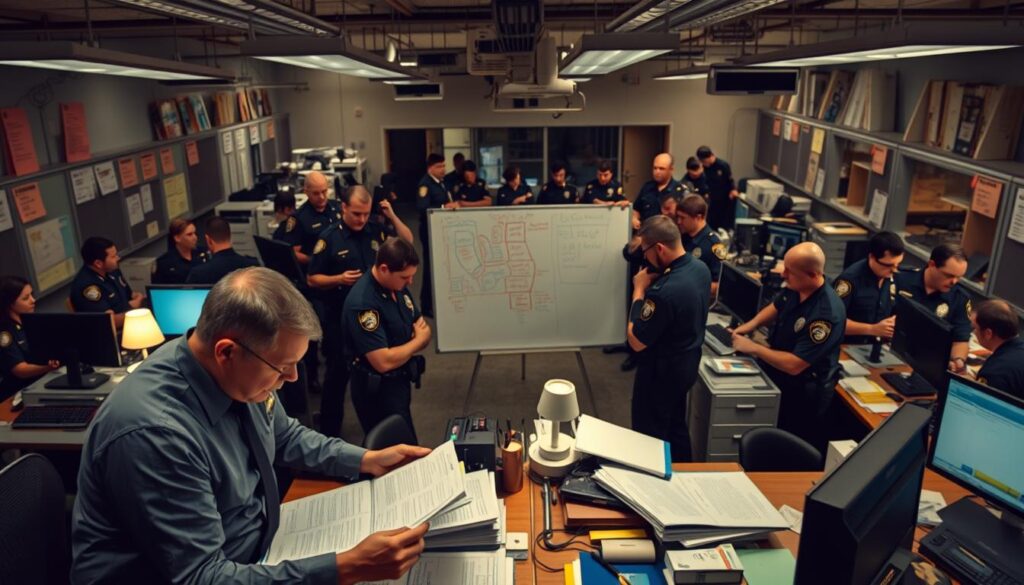
Exploring Roles in Brantford Police Service and Beyond
The Brantford Police Service showcases how local teams create wide-reaching impact. Officers recently managed rolling road closures during the Special Olympics Torch Run—one of many community-focused events requiring precise coordination. You’ll find opportunities in:
- Traffic management during large gatherings
- Joint drug enforcement operations with provincial partners
- Youth mentorship programs reducing neighborhood risks
Collaboration defines modern policing. Six Nations Police and OPP units regularly team up with municipal services for initiatives like holiday safety campaigns. This interconnected approach helps address complex challenges more effectively.
Benefits and Challenges of a Career in Law Enforcement
Choosing this path offers stability through pension plans and ongoing skill development. However, irregular shifts and high-pressure scenarios test resilience. 91% of recruits report the rewards outweigh difficulties when making tangible community improvements.
You’ll need physical stamina and emotional intelligence to thrive. Regular training updates keep officers prepared for evolving situations—from cybercrime investigations to de-escalating public conflicts. Application deadlines follow strict dates, so planning ahead proves crucial.
law enforcement jobs ontario: Opportunities and Career Paths
Public safety careers in Canada span over 35 distinct specializations, from digital forensics to crisis negotiation. These roles tackle evolving challenges while fostering community trust through collaborative initiatives.
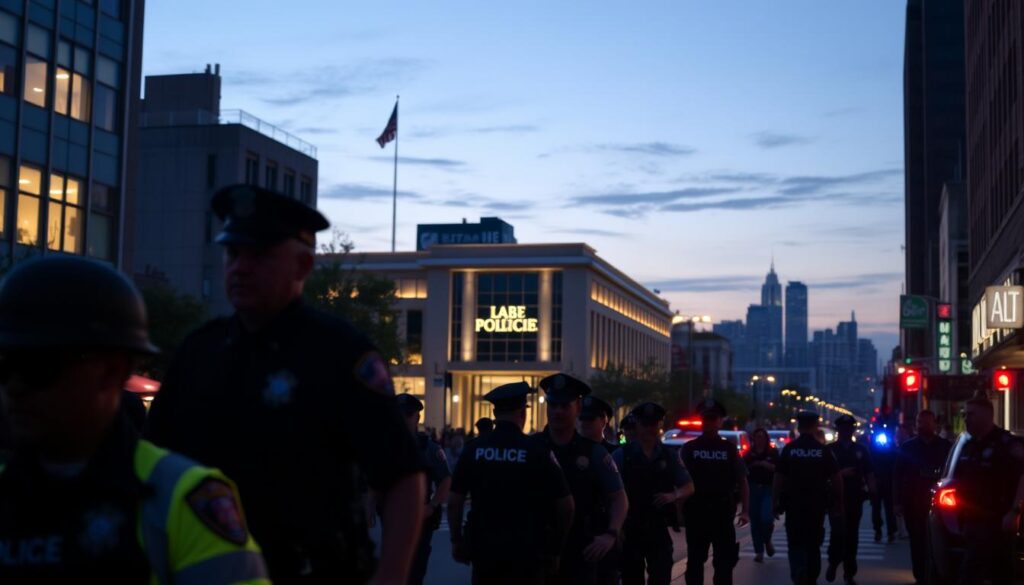
Diverse Opportunities Within Canadian Police Services
Frontline patrols form just one aspect of modern public safety work. The Brantford Police Service, for example, balances crime prevention with youth mentorship programs and multi-agency drug operations. You might specialize in:
- Cybercrime investigations tracking digital threats
- Forensic analysis supporting major case resolutions
- Community outreach improving neighborhood relations
Specialized units like emergency response teams require rigorous training but offer accelerated growth paths. Seasonal hiring often aligns with event dates, such as security planning for large public gatherings.
Advancing Your Career: Training and Promotion Paths
Most agencies outline clear advancement criteria, from constable to supervisory roles. Annual skill upgrades keep professionals prepared for leadership positions. The Brantford Police Service prioritizes ongoing education, reimbursing courses in conflict resolution and crisis management.
Promotion timelines typically require 3-5 years of service before eligibility for specialized units. Application dates for advanced training programs follow strict cycles—mark your calendar for spring and fall intake periods.
Navigating the Application Process for Police Careers
Applying for a police position requires attention to detail and timely submissions. Agencies like the City of Mississauga use automated candidate profiles to streamline hiring—your preparation determines how smoothly this journey unfolds. Start by researching each service’s unique expectations, as requirements vary across regions.
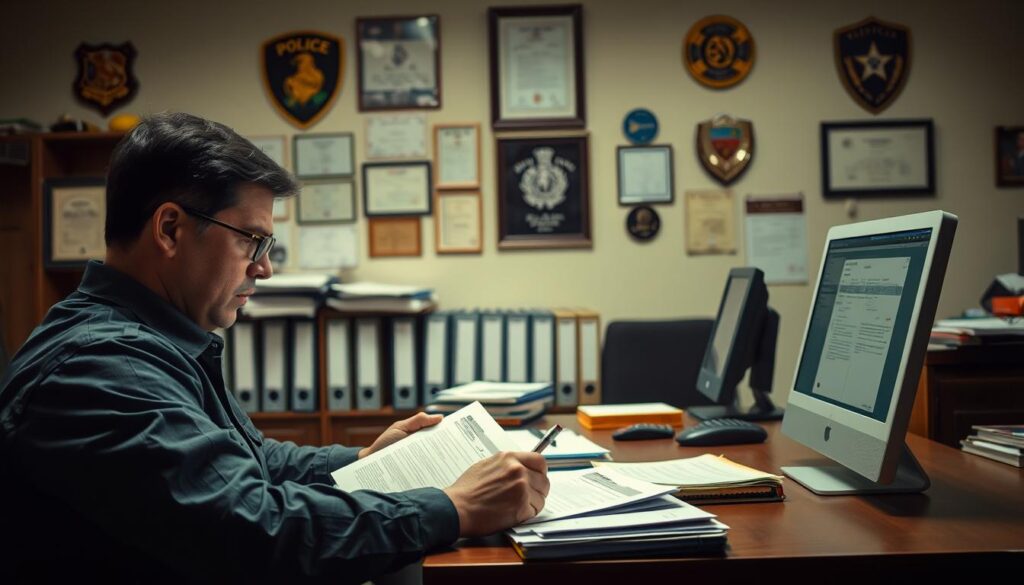
Preparing Your Application and Required Documentation
Gather these essentials before submitting:
- Verified educational transcripts and certifications
- Clean criminal background check results
- Medical fitness reports signed by licensed practitioners
Many services now request video introductions alongside traditional resumes. Double-check submission formats—some agencies reject files exceeding 5MB. Tailor your content to highlight crisis management skills or volunteer experience.
Application Timelines and Key Dates
Recruitment cycles often follow quarterly patterns. Spring and fall intake dates see the highest competition. Mark these critical phases:
- Initial screening (2-4 weeks post-deadline)
- Physical/psychological testing windows
- Final panel interviews
Set email alerts for updates—74% of services now use automated reminders. Missed dates can delay your process by 6-12 months.
Tips for Acing the Interview Process
Prepare for scenario-based questions testing decision-making under pressure. One recruiter notes: “We assess how candidates balance protocol with community needs”. Practice articulating your understanding of modern policing challenges, from cyber threats to mental health crises.
Dress professionally and arrive early—first impressions matter. Many services conduct background verifications post-interview, so maintain consistent communication until final offers arrive.
The Role of Law Enforcement in Canadian Communities
How do neighborhood safety initiatives transform communities? Through boots-on-the-ground strategies and collaborative partnerships, public safety teams address risks before they escalate. Recent drug seizures exceeding $29,000 demonstrate how proactive measures disrupt criminal networks while protecting residents.
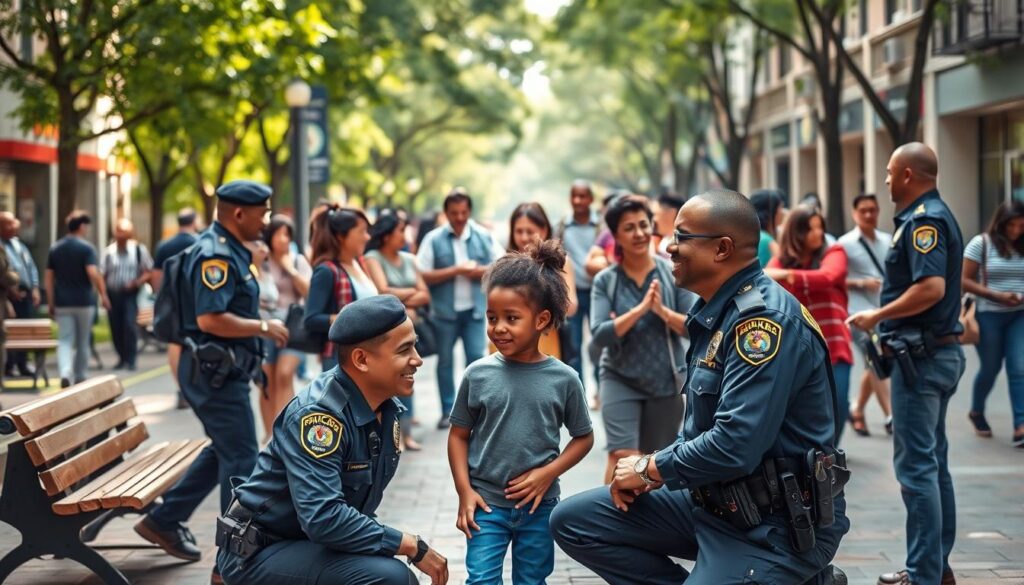
How Police Services Impact Community Safety and Crime Prevention
You’ll find officers working beyond emergency responses—mentoring youth groups and coordinating events like the Special Olympics Torch Run. These efforts build trust while addressing root causes of crime. One sergeant notes: “Our presence at community centers reduces vandalism reports by 40% annually.”
Crime prevention programs blend education with action. Traffic safety workshops and cybercrime awareness sessions empower residents. Data-driven patrols target hotspots identified through resident feedback and crime pattern analysis.
Collaboration amplifies results. Schools, social workers, and local businesses partner with the police service to create safer spaces. 91% of participants in youth engagement initiatives report improved attitudes toward authority figures.
Your understanding of these efforts reveals how public safety extends beyond arrests. It’s about fostering resilience through relationships—one neighborhood block at a time.
Conclusion
Public safety careers empower individuals to make tangible differences in neighborhoods across the province. From municipal teams to specialized units, these roles demand both skill and dedication. Your preparation—understanding requirements and refining interview techniques—sets the foundation for success.
Securing a position requires attention to deadlines and thorough documentation. Physical readiness and emotional resilience prove crucial when facing assessments. Each step brings you closer to roles that directly influence community trust and safety.
These careers thrive on proactive problem-solving and collaboration. Whether mentoring youth or managing crises, your actions foster safer environments. Assess how your values align with the demands of protecting others.
Ready to start? Research agencies matching your strengths and reach out for guidance. Your journey toward meaningful work begins now.

